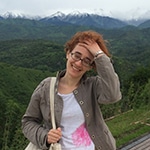The Soviet-era bards were singer-songwriters who combined poetic lyricism with simple, guitar-accompanied melodies. The artform emerged in the 1950s shortly after the death of Stalin. Although it remained underground for nearly all of the Soviet period, it became a soundtrack for the lives of many Soviet citizens throughout the 1960s and 70s and beyond.
Bardic music is referred to as avtorskaia pesnia (author’s song) because it is written and performed by the author, who thus takes full ownership of the music. The songs usually focus on personal experiences or express philosophical and/or even political themes, the latter often expressed carefully through allegory or innuendo. For students of Russian, avtorskaia pesnia can present a challenge – as the lyrics are often highly poetic, vague, and/or topical.
Performances were typically informal, occurring at home gatherings (known as kvartirniks, after the Russian word for “apartment”), in student dormitories, or on camping trips, where their songs resonated deeply with listeners who saw them as voices of authenticity in a highly regulated cultural landscape.
Because it was “unofficial” and because the Soviet state controlled all official music production in the USSR, avtorskaia pesnia spread most commonly through what was known as magnitizdat—homemade cassette and reel-to-reel tape recordings copied and passed from hand to hand. It is said that one could tell how popular a song was by how bad the recording was; the most popular songs would eventually reach some listeners as recordings of recordings of recordings.
The Soviet government often tolerated the bards. Vladimir Vysotsky, for instance, had an illustrious stage and film career in addition to being a famously prolific bard. He even counted Soviet premiers as a fans of his music. However, bards who got too political could be arrested and forced into exile. Such was the fate of Alexander Galich. Bards were so driven by their art that they were often willing to risk their freedom to perform their songs.
Bulat Okudzhava
Булат Окуджава
Bio by Julie Hersh
Bulat Okudzhava (1924–1997) was a Georgian-Armenian Russian-speaking poet and singer-songwriter, and one of the founders of Russia’s bardic tradition.
Okudzhava’s parents both worked for the Communist Party, and both were arrested during the Stalinist purges. His father was shot in prison soon after, and his mother spent more than a decade in labor camps. Okudzhava was raised by other relatives in Tbilisi, Georgia. He started writing poetry as a child. He volunteered for the army in 1942, when he was 17, and on the front began composing music, though he had no musical education. His first known song, “We Didn’t Sleep Well on the Cold Freight Wagon” (“Нам в холодных теплушках не спалось”), appeared in 1943. After the war ended he continued his education in Tbilisi, studying poetry, literature, and, later, teaching. He spent two years teaching grade school in the provincial city of Kaluga, Russia.
In 1956, following the death of Stalin, his parents were rehabilited in the Khruschev thaw. Okudzhava was able to join the Communist Party, which opened doors for him. His writing began to appear regularly in newspapers, and his first book of poems, Lyrics (Лирика), was also published in 1956. That same year 1956, his earliest surviving record song, “Frantic and Stubborn” (“Неистов и упрям“), was recorded. In the late 1950s, he began to perform his songs publicly, and he became widely known in the Soviet Union. His music circulated on the radio and TV and on homemade records called magnitizdat.
In 1961, he quit his day job as an editor to focus on his writing and music. In 1962, he became a member of the Union of Soviet Writers, allowing him more publishing opportunities. His first album appeared in 1968 in Paris, but his albums only began to be released in the USSR in the 1970s. He achieved more widespread recognition in 1970, when his songs began to be featured in major films like Belorusskiy Train Station (Белорусский вокзал) and White Sun of the Desert (Белое солнце пустыни) and more. Okudzhava also wrote stories and novellas, although he is more known for his poems and, of course, his songs. His last poetry collection, Drinking Tea on Arbat (one of the main avenues in Moscow) (Чаепитание на Арбате), came out in 1996.
Unlike other members of the bardic musical tradition, Okudzhava did not officially participate in Soviet dissident culture, but he did occasionally run into trouble. He developed many contacts outside the USSR, especially in Poland and France, which eventually lead to his loyalties being questioned. In the 1970s, he had to publish a public statement decrying his poems being published by the Parisian émigré publishing house Posev, which the authorities determined had managed to “interpret my work in a spirit hostile to us.” Today, he is widely remembered and honored, with a state museum in his honor in Peredelkino (a suburb of Moscow) and a statue of him on Old Arbat Street. One of his best-known songs is also about the Arbat.
Aleksandr Dolskiy
Александр Дольский
Bio by Julie Hersh
Aleksandr Dolskiy is a Russian bard whose songs have less of a folk style than do those of some bards—his musical education was extensive, and his songs display a high degree of musical and poetic complexity. He is also a true guitar virtuoso capable of impressive performances, and is a laureate of many prestigious Russian art and cultural awards.
Dolskiy was born in 1938 in Sverdlovsk (today known as Yekaterinburg) to an opera singer father and a ballerina mother. As a child he was interested in theater and music, and he began his professional acting career at the age of 10, when he was part of the choir in the Sverdlovsk Theater in several productions. He picked up the guitar soon after and started writing poetry as well. When he was only 16 he wrote the song “The Young Girl Cried” (“Плакала девчонка”), which achieved the status of a folk song across the USSR.
In his youth, he performed with the Sverdlovsk Philharmonic as a guitarist and his poetry was published in local journals. He wrote songs for theatrical productions in Sverdlovsk and nearby cities. He also showed promise as an academic, studying the economics of construction, and he continued this career throughout his life. He continued writing songs and by 1966 was performing solo concerts all over the USSR, gradually becoming famous. Like many other artists of the time, his songs were censured by the Communist Party, and many of them were only available unofficially or underground.
Dolskiy holds degrees in both music and economics. He trained as a toolmaker in his youth and, after graduation, held a career at the Research Institute of Urban Development in Leningrad (now St. Petersburg) while pursuing music and also acting at The Leningrad Theatre of Miniatures (now renamed The A. I. Raikin Variety Theatre).
In the 1970s, he began writing songs for Lenfilm Studios and later began starring in them as well. In 1979, he became a member of the Union of Soviet Writers, giving him more publishing opportunities. He released his first full-length record in 1980, Star in Hands (Звезда на ладони). He toured more widely and attracted bigger and bigger crowds all over the world. He was named an Honored Artist of the RSFSR 1989 and was awarded the Bulat Okudzhava State Prize in 2002. He is still continuing his art in St. Petersburg today.
Aleksandr Rozenbaum
Александр Розенбаум
Bio by Julie Hersh
Aleksandr Rozenbaum (Александр Розенбаум) is a Russian/Soviet bard, singer-songwriter, and poet who is widely known across Russia. His songs—there are more than 800 of them—have been popular for decades, and he has won many Shanson of the Year and other awards.
He was born in 1951 in St. Petersburg to parents who both worked in healthcare. He went to music school and studied piano, and then went on to a music institute, where he studied jazz arrangement. Rozenbaum started writing poetry and playing the guitar as a teenager. He pursued medicine as a career, working as an emergency medicine doctor for several years after university, but he didn’t give up music, writing songs about his work in the ambulance during breaks. Eventually he gave up medicine in favor of music.
Rozenbaum is often considered a “criminal” bard, referring to his musical genre, which crosses into shanson. Scholars of his work, however, pointout that he can’t be easily pigeonholed.
Among his repertoire are many songs about St. Petersburg, his beloved home city, and a cycle of songs about Odessa, inspired by the short stories of Soviet Jewish writer Isaac Babel. He has also written about Russian history. His songs about the year 1937, one of the periods of heightened purges under Stalin, were repressed by the authorities although he wrote them in the 1980s. He also wrote songs about the the Decembrists and World War II that were apparently more acceptable.
Rozenbaum also wrote songs during perestroika and after the fall of communism expressing his ambivalent views about that time of reform and later collapse. He is known for having a deep love for Russia, and was named a People’s Artist of the Russian Federation in 2001. He also served as a deputy in the Duma, in the United Russia party (the party led by Putin), from 2003 to 2005. Having released more than 30 records starting in 1981, he still writes songs and tours to this day.
Yuli Kim
Юлий Ким
Bio by Julie Hersh
Yuli Kim is a Soviet and Russian bard, playwright, songsmith, and poet known for his sharp political satire and deeply poetic songwriting. Born in Moscow in 1936, his Korean father was shot in the Stalinist purges in 1938. His Russian mother was sent to labor camp that same year. He was raised by his maternal grandparents until 1945, when his mother returned. He pursued a career in education, working as a schoolteacher teaching history, literature, geography, and other subjects while also directing musical theater there.
Kim’s repertoire includes songs that blend wit, irony, and social critique. Most of his songs, particularly the most popular are highly political. He was forced to resign his teaching position in 1968 due to his human rights activism. However, he remained active in the underground music scene and in producing music for films and theatrical performances, especially those produced for children. Much of this was done under the pseudonym Yu. Mikhailov, which he used in part to mask his political identity and to make his ethnic roots.
With glastnost, he again insisted on using his real name and was even able to publish his music officially with the Soviet agency Melodiya. Although he praised the freedom of the 1990s, he chose to emigrate to Israel in 1998, where he still resides and produces music. He was awarded the State Prize named after Bulat Okudzhava in 1999. He has remained active in Russia’s art scene, however, producing librettos for the musicals Monte Cristo, Count Orlov, and Anna Karenina, which all had long runs at the Operetta Theatre in Moscow. In December 2021, for his 85th birthday, he gave a jubilee concert at the Moscow House of Music. He has also remained active in politics, supporting the Yabloko liberal political party, and recently has written a string of songs criticizing the War in Ukraine.
Vladimir Vysotsky
Владимир Высоцкий
Bio by Julie Hersh
Vladimir Vysotsky was one of the most celebrated figures of the late Soviet cultural scenes, both underground and public. He is best known as a Russian singer, performer, and poet and one of the greatest examples of the Soviet bard tradition. He was also an inspiration for many members of Soviet society who disagreed with the regime’s policies but were not able to dissent openly or politically.
Vysotsky was born in the Moscow region in 1938 and grew up mainly in Moscow. He began writing poetry and songs when he was young, and his artistic career started when he attended the Moscow Art Theater (МХАТ) from 1956 to 1960, where he studied acting. He then started a very successful acting career that saw him star to wide and public acclaim on the stage, in television dramas, and on the silver screen.
Although he was equally famous for his singing and songwriting, those had to be kept largely underground. Although much of his music is just storytelling and/or humor, he also many songs that were told in allegory that offered criticism of Soviet society and politics. His first songs also appeared around the time that he finished school: his first song is usually considered to be “Tattoo” (“Татуировка”), from 1961. None of his music was officially released in the USSR until the late 1980s, but homemade copies of his recordings were circulated underground long before that, and he also performed in clubs and universities. The overt subject matter of most of his songs was daily Soviet life, which he often subtly satirized, but his music was mainly known for displaying moral authority and conscience. He was likely kept from arrest or exile by the fact that he reportedly had fans in the upper echelons of Soviet authority; Brezhnev and Khruschev were both said to collect his works.
Vysotsky struggled with alcoholism and drug addiction for much of his adult life. He died at 42 of a heart attack brought on by his additions. He remains legendary, however, with vigils held him each year at his grave in Moscow. Many singers try to imitate his trademark bombastic growl when they perform. There are now numerous streets, museums, and monuments in honor of him all over Russia and in other countries. Many Soviet and Russian poets and singers count him among their biggest influences. In 2011 a high-budget biopic was made of his life.
Aleksandr Galich
Александр Галич
Bio by Julie Hersh
Aleksandr Galich was a Russian/Ukrainian singer-songwriter, bard, poet, and Soviet dissident. He was born in present-day Ukraine (Dnepropetrovsk) to a family who enjoyed, though did not create or participate in, music and art. He grew up mainly in Moscow, where he took piano lessons and wrote poetry. He was first published when he was only 14. His name was originally Ginzburg, but he went by Galich professionally to hide his Jewish background.
Galich attended a theatrical institute after he finished secondary school, and when WWII broke out, he moved south, to Grozny, where he briefly joined the Theater of National Heroics (Театр народной героики). He then moved to Chirchiq, in Uzbekistan, for more theatrical activities. He acted, but also wrote plays, songs, and poetry. His artistic career grew in fits and starts after that: his first big success as a playwright was Marching (Походный марш), the songs of which became widely popular in the Soviet Union. His next plays and musicals, written in the late 1940s and 1950s, continued to achieve more popularity and success across Russia and the USSR. In 1955, MXAT, a prominent Moscow theater, premiered two of his pieces. He added cinematography to his already long list of artistic roles, and began writing screenplays as well. He even crossed paths with now-legendary comedy directors Leonid Gaidai and Eldar Ryazanov.
Galich turned into a bard late in his career, only in the 1960s, while also continuing the other strands of his career. He wrote his first song in the bard genre, “Lenochka” (“Леночка”), in 1962, and many, many more followed quickly. He worked in two completely disparate genres—satirical political pieces and more heartfelt, sad songs—simultaneously, confusing some of his listeners. His popularity as a bard was acknowledged at a festival in Akademgorodok in 1968, when he won a big prize—and the respect and admiration of the Soviet artistic and academic world—for his song “To the Memory of Pasternak” (“Памяти Пастернака”).
His bard career began veering into seditious territory, and the authorities did not appreciate his social commentary and warned him to back off. But he kept going, making self-recordings of his music and illegally distributing them. He was thrown out of the Union of Soviet Writers and then of the cinematographers’ union. He became a national pariah, unable to work anywhere, and was ultimately thrown out of the USSR despite his objections. He lived in France for the last years of his life, working in relative comfort. He died in 1977 after he accidentally electrocuted himself while trying to adjust his radio antenna. (There are unconfirmed rumors that he was actually killed by the KGB.)
Veronika Dolina
Вероника Долина
Bio by Julie Hersh
Veronika Dolina (Вероника Долина) is a Russian singer, poet, and bard—one of the few women in that male-dominated genre. She was born and raised in Moscow, to an aircraft-designer father and a doctor mother. She studied at music school when she was young and then entered the French department at university, training to be a French teacher. She started her musical career even before graduating.
Dolina started writing songs in 1971, and her debut performance was that same year. She later joined the Club of Self-Written Songs (Клуб самодеятельной песни), an informal union for Soviet bards. However, she did not achieve the same stunning popularity as some of the other bards who were active during that time. One reason given for that is that her lyrics focused on “womanly” subjects, and her performances were “sharp,” typical for many bards, but unusual for a woman singer.
Though Dolina performed frequently, her first record was not released until 1986, when perestroika had started and the Soviet Union was loosening up. After this, though, she released many albums—five alone between 1986 and 1990, and an additional twenty after that. She has also, to date, published more than twenty collections of her song lyrics and poems.
Dolina has toured all over the world and written more than 500 songs. She has won the Venets (Венец, “wreath”), a Russian literature prize given out by the Moscow Writers’ Union. These days, she is still performing concerts and releasing records and books. While her political activities are not well-publicized, it is perhaps telling that she proudly posted a birthday letter of congratulations from the Moscow Bureau for Human Rights (Московское бюро по правам человекам—an NGO supported by the European Commission) on her personal website, which wishes her “new achievements in her important work, unfailing and vital optimism, happiness and goodness” and hopes for further cooperation with her. In addition, Radio Free Liberty has made a video program about her.
Aleksandr Bashlachev
Александр Башлачёв
Bio by Julie Hersh
Aleksandr Bashlachev is well known as SashBash (СашБаш, a portmandeu made of Sasha, the common nickname for Aleksandr, and his last name). He was a Soviet/Russian singer-songwriter, poet, and bard, a popular performer in the Soviet underground circuit.
Born in Cherepovets, Vologda oblast, Bashlachev went to school and university there and initially worked in metallurgy. He later moved to Sverdlovsk to study journalism but also worked with a Cherepovets rock band, Rock September, writing their songs, though not in his preferred personal style.
After he finished journalism school, his own music started to become known, and he wrote and performed some hits, starting with “Griboedov Waltz” (“Грибоедовский вальс”). He worked for a time at Communist (Коммунист), a newspaper, but soon gave it up to focus on music. He started appearing at rock festivals, first among them in Leningrad in 1984. He became acquainted with some of the major players in the music scene, chief among them the music journalist Artyom Troitskiy, and they helped him organize a concert tour—though in people’s apartments, not in major venues. He traveled all over Russia and Central Asia, performing these “kvartirniki,” and wrote an extraordinary number of songs during these travels. His style borrowed from the best of Vysotsky while mixing in pronounced punk influences.
Bashlachev released a self-produced album in 1985, called The Third Capital (Третья столица), and, with perestroika, was able to perform bigger concerts and release more albums, produced in studios. However, he also became severely depressed. He died at the age of 27 after a fall from an eighth-story window in what was likely suicide. His followers have continued to release recordings of his work even after his death.
Igor Rasteryaev
Игорь Растеряев
Bio By Julie Hersh
Igor Rasteryaev (Игорь Растеряев) is a Russian singer, poet, musician, and actor. He is something of a newer generation of bard—he didn’t come of age until after the collapse of the Soviet Union, so he didn’t partake in the underground activities that are usual for bards, but his musical style fits well within the genre and he has gained fame, in part, through YouTube videos.
When Rasteryaev was young, he spent his summers in a village near Volgograd. He joined a sort of musical club of youth that hung out at the village store in his neighborhood and played songs for each other. He began with covers, but then started to write his own songs. He started to play the accordion, too. During an informal performance of his song “Combine Operators” (“Комбайнеры”), his friend and future collaborator Lyokha (Aleksey) Lyaxhov recorded him on his mobile phone and put it on YouTube. A few months later, the song, about how hard farmers work and how little respect they often get, suddenly went viral. This was in 2010, and suddenly Rasteryaev had a budding singing career. He continued uploading clips of himself to YouTube, becoming on of Russia’s first YouTube musical sensations. Now, he most often accompanies himself with an accordian, rather a guitar, which also sets himself apart in the bardic tradition.
Rasteryaev took the music career and ran with it, releasing his first album, the highly patriotic Russian Road (Русская дорога), in 2011. He released a few more over the next few years, as well as a book of drawings; he also drew a cartoon music video for one of his own songs. At his concerts he sings not only his own songs but old war songs, Cossack traditional songs, and covers of popular songs by Soviet rock bands. He has released eight albums now, and many music videos, some hand-drawn.
In the middle of all this, though, Rasteryaev has also had a fairly successful acting career. He had started out working at the St. Petersburg theater Buff after finishing school, and he occasionally had roles in films. The relatively big-budget and well recieved The Three Bogatyrs: The Princess of Shamakhi and Ivan Tsarevich and the Gray Wolf apparently stole his music for thier soundtracks – yet, he has not complained as he believes the wider his music is shared, the better.
Like many bards, he has remained highly vocal and political – with his views often reflecting those of Russia’s conservative rural areas. His latest album, The Cycle (Kруговорот), is perhaps one of his darkest and angriest in its commentary, mourning the plight of the working man, decrying the emptying of the Russian countryside, and offering songs that discuss the horrors of war and longings for peace.
More on Russian Music
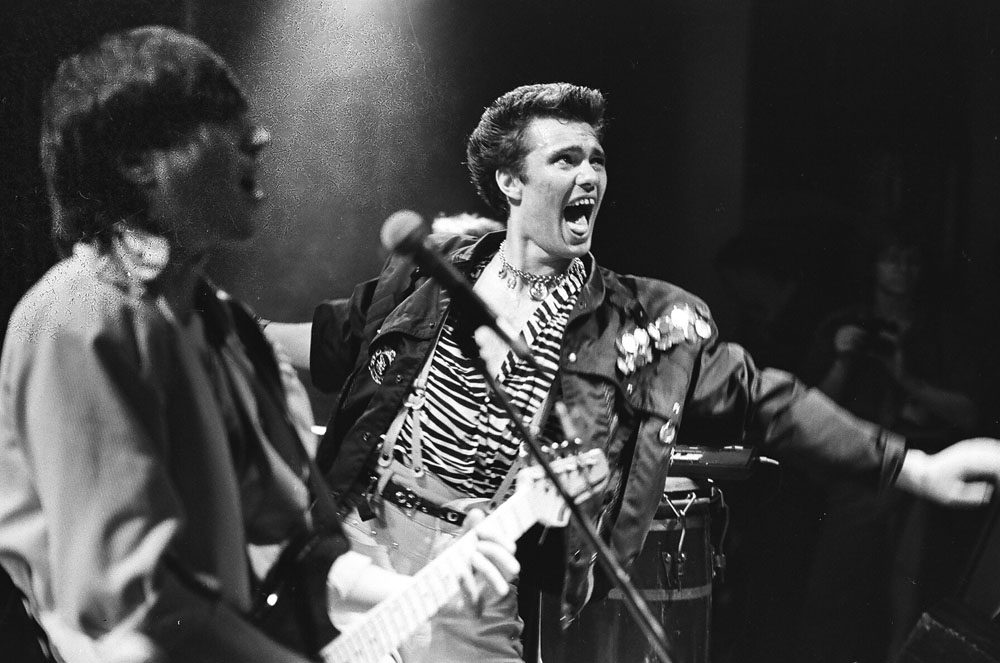
Music To Fall For: The Soviet Rock Revolution
The USSR did its best to control culture and make it serve the needs of the state. However, culture, like life itself, finds a way of spreading, evolving, and surviving, often against all odds. Rock music had, by the 60s and 70s, become a cultural phenomenon in Europe and America and its spread to the […]
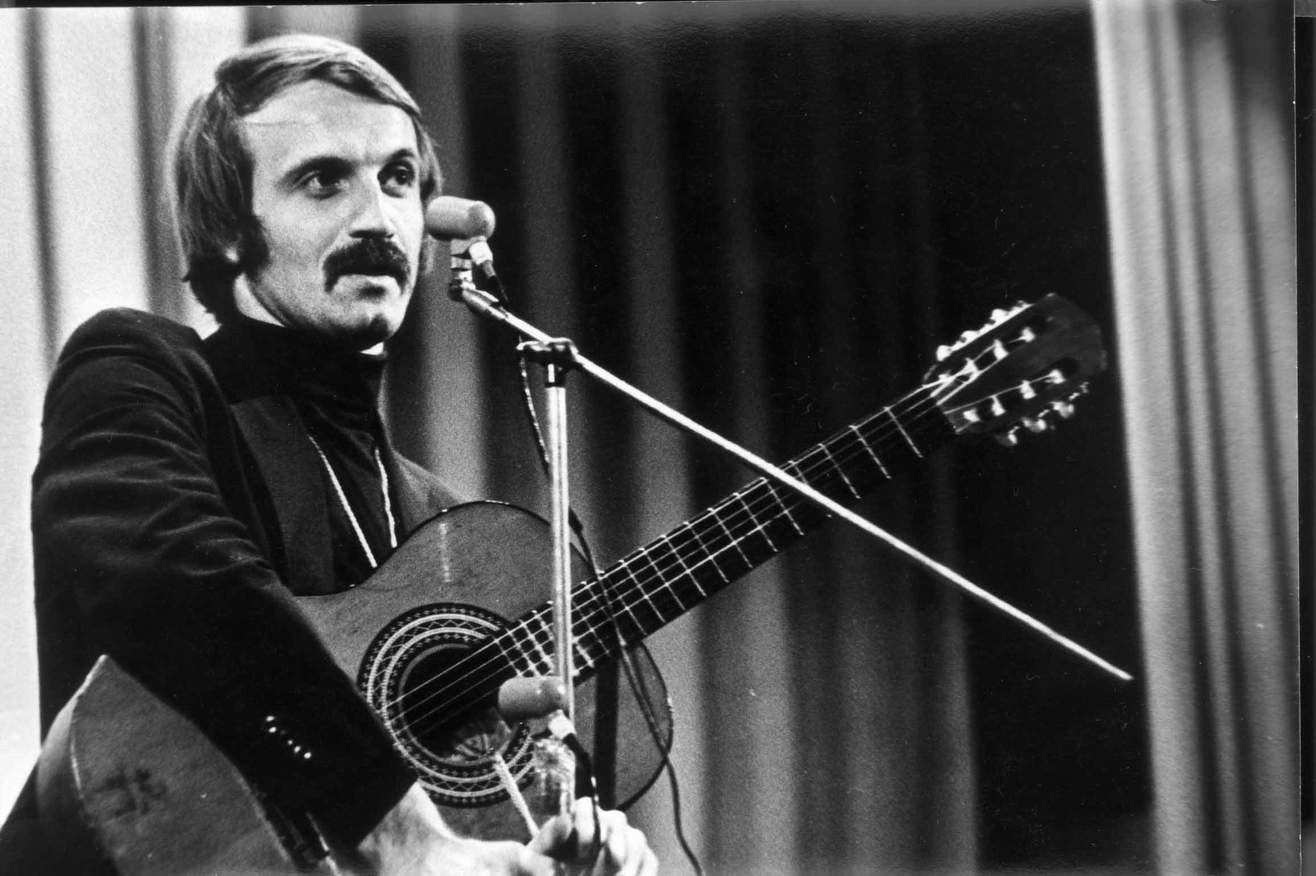
Poets with Guitars: The Semi-Underground World of Soviet Bards
The Soviet-era bards were singer-songwriters who combined poetic lyricism with simple, guitar-accompanied melodies. The artform emerged in the 1950s shortly after the death of Stalin. Although it remained underground for nearly all of the Soviet period, it became a soundtrack for the lives of many Soviet citizens throughout the 1960s and 70s and beyond. Bardic […]
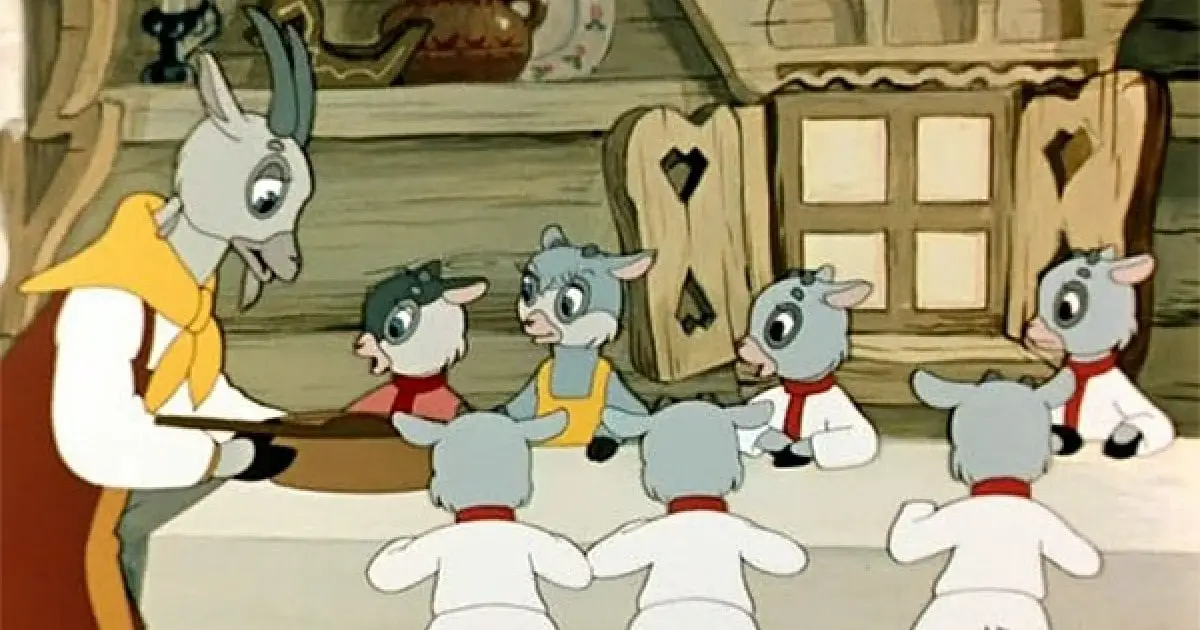
Classic Soviet Cartoons to Help You Learn Russian
For language learners, classic cartoons offer an engaging and accessible way to absorb vocabulary, pronunciation, and cultural context. When it comes to Russian, few resources are as rich and entertaining as the animated films produced by Soyuzmultfilm, which was the Soviet Union’s and is now Russia’s premier animation studio. Founded in 1936, Soyuzmultfilm has to […]
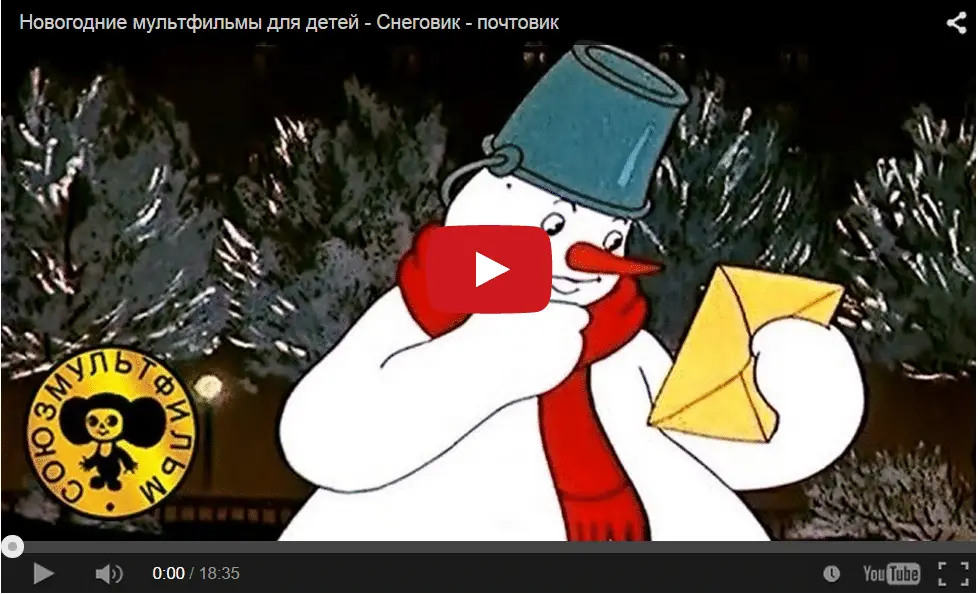
15 Soviet Cartoons to Put You in the Holiday Spirit
These cartoons are full of joyful, bright, and homey holiday charm. It’s no secret that the holiday season is most precious to us in childhood. Because for children, it is not just an opportunity to gather together with loved ones. It’s an occasion for presents, Grandfather Frost, Snegurochka, beautiful spruce trees, and hope for a […]

Where to Find Russian Movies and Music Online
PopKult gives an expansive overview of contemporary pop culture in Eurasia. Explore our site for infromation on movies, music, brands, TV, and much more. Here are a few other resources you might check out for more Russian classic movies, cutting-edge bands, and language practice! Watch More Russian Movies! Below are links to sites that […]


